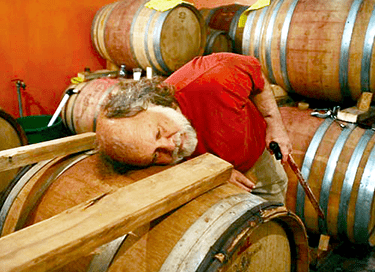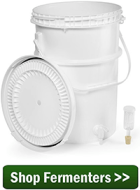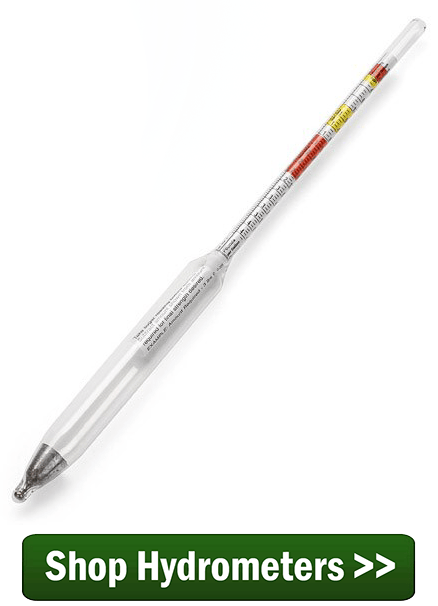 I started a batch of Merlot, it has been in the secondary fermenter under airlock for the last month. It is clearing very nice. How do I determine when the fermentation is done?
I started a batch of Merlot, it has been in the secondary fermenter under airlock for the last month. It is clearing very nice. How do I determine when the fermentation is done?
Thanks,
Brandon
—–
Hello Brandon,
Thanks for the great question.
Knowing that your fermentation is done before moving forward in the winemaking process is important. If the wine gets all the way to the point of bottling, and the fermentation has not finished, one of two things can potentially happen: either the wine corks will begin to pop out of the wine bottles; or worse yet, if the corks are very snug, you could have bottles exploding.
During a fermentation sugar is being metabolized into both alcohol and CO2 gas. This gas is the same stuff that puts the fizzy in beer, soda pop and champagne, and it’s also the stuff that comes through the airlock and creates the bubbling action.
A lot of beginning winemakers will use the airlock to make a determination. They see that the airlock is not longer bubbling and figure this is when the fermentation is done. In reality, the fact that the bubbling stopped is only an indication that the fermentation may be done, but is is not an absolute indicator. It does not necessarily mean that all the sugars are gone from the wine must, and it definitely doesn’t mean that the fermentation can’t start up again. It just may be dormant at the moment.
 It is very possible for a fermentation to stop and start back up again sometime later. This is known as a stuck fermentation. It is usually caused by some environmental change that the wine yeast does not like – temperature being the most common factor. The important thing to know is that it is possible to bottle a wine that has stopped bubbling and have it start fermenting again after bottling – in the bottle! This CO2 has no place to go and builds up pressure in the wine bottle and well… there’s-your-trouble.
It is very possible for a fermentation to stop and start back up again sometime later. This is known as a stuck fermentation. It is usually caused by some environmental change that the wine yeast does not like – temperature being the most common factor. The important thing to know is that it is possible to bottle a wine that has stopped bubbling and have it start fermenting again after bottling – in the bottle! This CO2 has no place to go and builds up pressure in the wine bottle and well… there’s-your-trouble.
This begs the question, if the bubbling action through the airlock is not a solid indicator as to when a wine fermentation is done, then what is? The key to all of this is knowing if there’s still sugar in the wine must. If there is then there’s still a potential for more fermentation. Fortunately for us winemakers, there is an easy solution. Use a wine hydrometer.
A wine hydrometer is what can tell you if there’s still sugar in the wine must. It’s very simple to use and gives a reading instantaneously.
A wine hydrometer is a long, closed, glass cylinder. It has a weight in one end and scales to read along its side. The readings are taken by seeing how high or low it floats in the wine. By observing where the surface of the wine crosses the scale on the wine hydrometer you can get your actual reading.
 By learning how to use a wine hydrometer, you can assure yourself that you will never bottle a wine too soon. You will be able to determine in moments where your fermentation stands.
By learning how to use a wine hydrometer, you can assure yourself that you will never bottle a wine too soon. You will be able to determine in moments where your fermentation stands.
You may be asking yourself at this point, “What if I want sugar in my wine”? If you like your wine with some sweetness to it, not a problem. Learn about making sweet wines on our website. It’s simple enough to do. You just have to know how to do it properly.
Brandon, hope this information helps you out. The hydrometer is the answer to the question: when is a fermentation done?
Happy Winemaking,
Ed Kraus
—–
Ed Kraus is a 3rd generation home brewer/winemaker and has been an owner of E. C. Kraus since 1999. He has been helping individuals make better wine and beer for over 25 years.

Can a wine complete fermentation and still have a SpGr reading at 1.000 or above. If so, how do you know and what do you do.
Thanks
Semper Fi
In the same predicament..
I enjoy your answers to peoples questions. But I would like to print your answers out without any advertisement. The print is so small with the advertisement on the same page. Keep up the good work.
I recommend copying and pasting the text of the article to a text editor like microsoft word and printing it from there, from what you’re saying I’m guessing you’re just printing the screen
At the second racking of my wine my Hydrometer read 0.996 os I thought all the sugar was gone. Just to make sure I used the Refractometer and the Brix was 7%. What am I to believe? I want to make a dry this time.
Thanks, William
Travis, what you are describing is a stuck fermentation. This is where the fermentation stops before all the sugars have fermented. This will result in SG readings high than they should be for a finish wine. I would suggest that you look over the following article to see why your fermentation stopped too soon. Once you know why you can fix the problem to get the wine fermenting again.
Top 10 Reasons For Fermentation Failure
http://www.eckraus.com/wine-making-failure/
William, what we know for sure is that one of the readings is wrong. SG and Brix are both completely convertible, and SG of 0.996 and a Brix of 7 do not convert. I would test both the hydrometer and refractometer in water to see that they are calibrated correctly. You should get an SG of 1.000 and Brix 0%, respectively.
I don´t know how his refractometer reading is to be interpreted in this context, but it is very possible that the wine contains a lot of sugar even if the hydrometer show a value of 0.996.
To reveal the true sugar content he can boil 100 ml wine down to 50% and add the 50% with water again – back to 100 ml. Taking a new reading he will probably get a value much above 1.000. That is the true sugar content.
I’m wondering if the alcohol content affects the refractometer reading. I only use the refractometer for unfermented juice. I would think that the hydrometer would be more accurate.
Bill, your assumption is correct. The presence of alcohol will throw the refractometer reading off. The hydrometer reading would be more accurate.
thank you for the good work. The tips are very useful.
Hi, I like a sparkling wine, as close to an Asti as possible, where can I get the information on how to do this ?
I recently just racked my wine into a carboy after fermentation for 6 days. now that it is in the carboy I have not seen any bubbling on my air lock, should it be bubbling constantly I don’t know why it hasn’t started yet and need some advice
Allison, because 70 percent of the fermentation takes place in the primary stage, it is normal for the activity to slow down in the secondary stage. It is also possible that the fermentation finished in the primary stage. I would monitor the progress with a hydrometer. If the hydrometer readings indicate that fermentation is not complete and the reading does not change, please take a look at the article posted below on the most common reasons for fermentation failure.
Top Reasons For Fermentation Failure
http://www.eckraus.com/wine-making-failure
Hello there, one thing i noticed was left out was the fact that various types of yeast can only survive up to a certain alcohol content. If one uses too much sugar to begin with, there could be plenty of residual sugar left, but too much alcohol for the yeast to survive. Therefore, a hydrometer isnt always a sure fire method. Please note that im not undermining the importance of a hydrometer, just saying that residual sugar is not the only factor in determining when a fermentation is over. Desert wines would not exist if that were the case.
Good point…after having a batch of Moscato corks popping from residual sugar and latent yeast, what seems to be working well is this: 2-3 rackings to remove visible yeast/sediment; at first racking I’ll add potassium metabifulfite, bentonite; second racking 2-3 weeks later potassium sorbate, fining agent; last, I filter wine with a vacuum pump and RO type sediment filter rig (1 micron for white and 5 for red). When bottling, I often backsweeten though I blend first and then filter this as well. No bottles popping anymore.
Any ideas how I can make a hydrometre & dose any 1 know what to do when fermenting is done do I have to add anything to the liquid before I bottle it thanks
Making a hydrometer on your own is not practical. As for what to add before bottling: you do not need to add any liquid, but you should be adding Campden tablets to the wine, one per gallon. AND if the wine still has sugar in it you should also add potassium sorbate to keep it from fermenting again in the bottle. Here’s a link to more articles about bottling wine:
https://blog.eckraus.com/?s=bottling+wine&submit=Search
If you have a precise electronic scale and a syringe, you can measure the mass of your wine in grams and divide it by the volume in milliliters. The unfermented must should fall between 1.07 and 1.1. It should finish around 1. This is what I do to find the specific gravity of my wines without a hydrometer.
If you have a precise electronic scale and a syringe, you can measure the mass of your wine in grams and divide it by the volume in milliliters. The unfermented must should fall between 1.07 and 1.1. It should finish around 1. This is what I do to find the specific gravity of my wines without a hydrometer.
I understand now about the hydrometer. But I didn’t use one to start so I do not have a starting read.
So, now how to tell if it is done fermenting? I have very fine bubbles coming up. The air lock either does not bubble or not when I am looking. Primary ferm in bucket, trans to carboy then one rack so far. Primary 7- 10 days, in carboy about a month. I have several varieties, all doing same actions.
Grape, mead, pineapple, lavender/ honey and rose.
Kynn, Even if you did not take a beginning reading, you will still know when it is complete by reaching a specific gravity reading of .998 or less.
I am VERY new at this. I’m doing muscadine wine and it no longer appears to be fermenting (finished in only a couple of weeks). Are the hydrometer readings still the same for this sweeter wine? Also, the wine is a bit cloudy still. Should I rack it and if so, can I rack it to a 5 gal container?
Hi everyone, I am new I started to make banana wine the 3rt of December 2021. Today 13 th of December I transferred to the jar with airlock, I don’t see any bobbles is it possible? Finished fermenting?
Thanks again